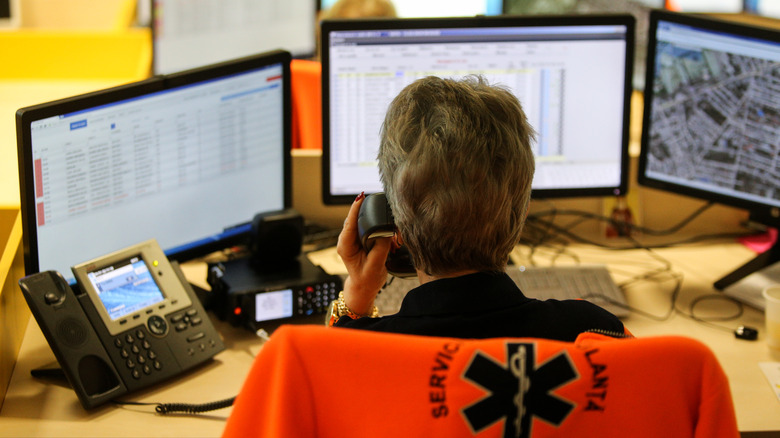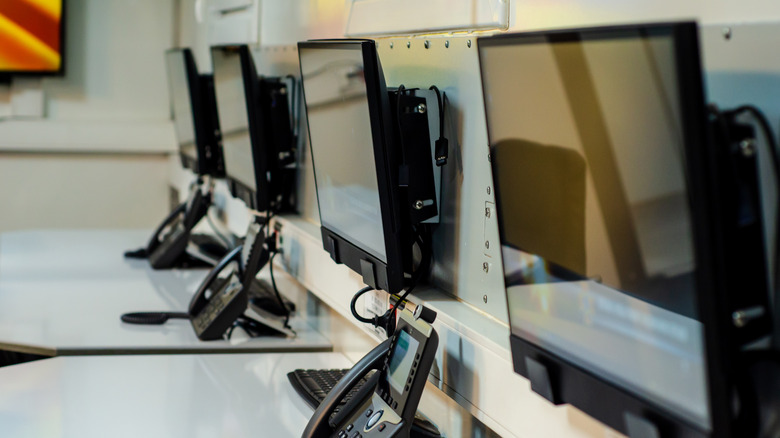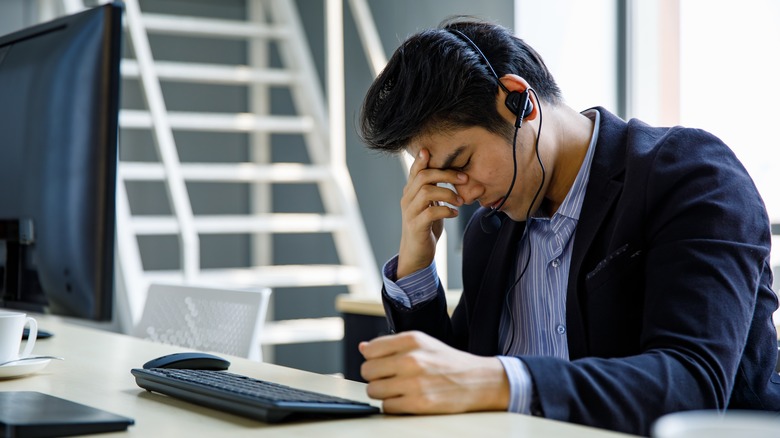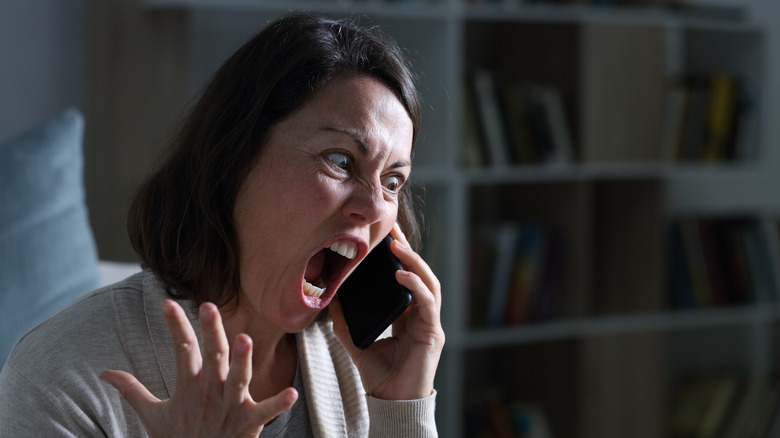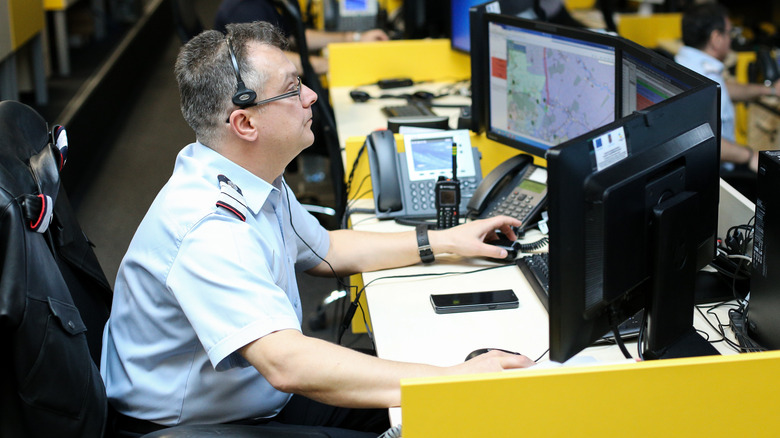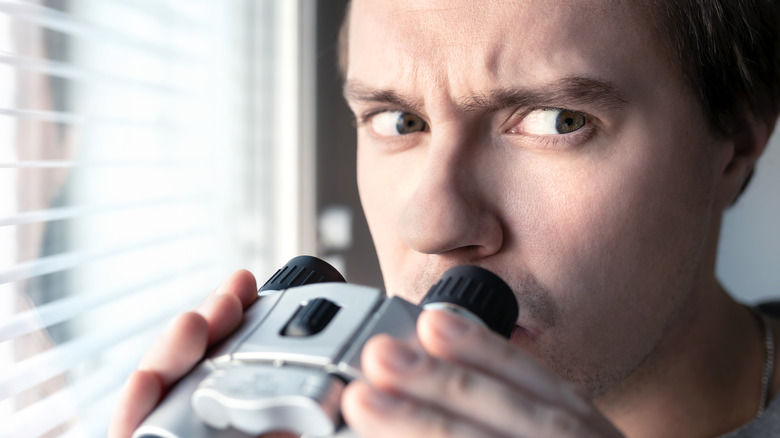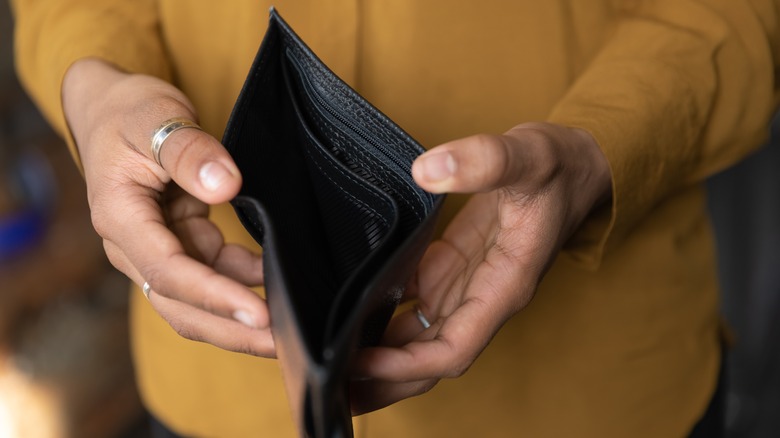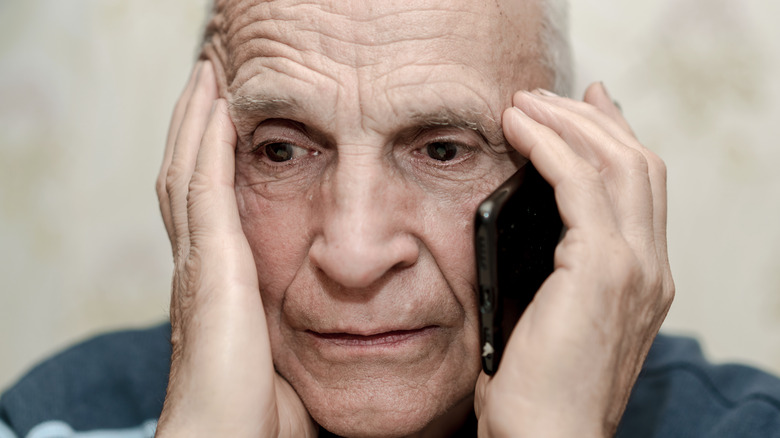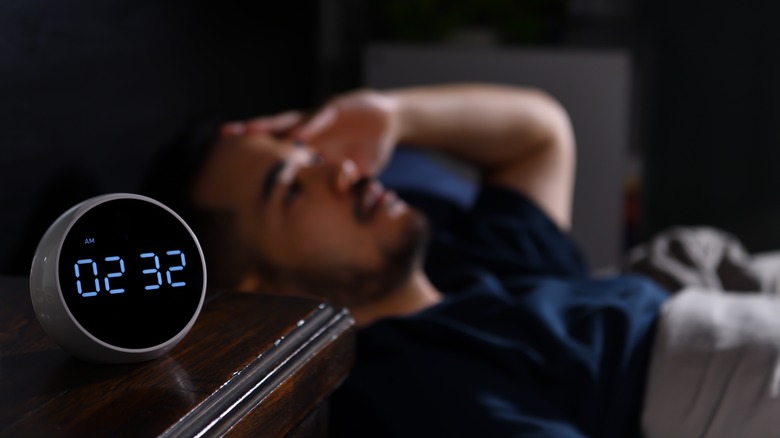What It's Really Like To Work As A 911 Operator
Our 911 emergency system is one of those aspects of modern society we rarely think about until we desperately need it. There's something obviously comforting about knowing that help is always available as long as you're near a phone. It's the ultimate sign of an advanced civilization, because it says that we value our fellow citizens and offer them assistance without question and without requiring an up-front fee or proof of anything other than need.
Like everything in this world, the 911 system relies on the commitment, energy, and hard work of human beings. When you call in with an emergency, you're not talking to a robot or a phone menu tree — you're talking to a real, live human being who has been trained to assist through a wide range of emergencies. Our 911 operators are the often-unsung heroes of emergency responses. They connect us to the police, the fire departments, and other resources that save lives and property while also insulating those resources from unnecessary prank calls or non-emergencies.
Unlike a lot of professions, there aren't too many depictions of 911 operators in pop culture, so most of us have very little idea what it's like to actually do this work. If you're thinking about a career as an emergency dispatcher or you're just curious, here's what it's really like to work as a 911 operator.
There's a lot of training
The first thing you'll experience as a 911 operator is a lot of training — but before you get to that, you have to get the job first. While the minimum requirements to apply for a 911 operator job will vary from state to state and even from municipality to municipality, according to Blue Collar Brain there are some basic universal requirements: You must be 18 years old or older, you must have good typing skills with few errors, you must have a high school diploma or GED, and you must pass a background check and (possibly) a psychological evaluation and drug screening. Reader's Digest adds that you'll need to have excellent communication skills, a strong knowledge of the geographical area, and a solid working knowledge of the local laws and regulations. According to 911-operator.org, you'll probably also need a driver's license.
Now the real work begins, because you have a lot of training ahead of you. Cosmopolitan reports that you'll need to be trained on the "massive" computer set-ups you'll be working with. These typically involve as many as eight separate screens as well as several keyboards and microphones. There's also typically a specific training program that must be completed, covering topics like basic telecommunications, hazardous materials handling, first aid, terrorist response, suicide counseling, emergency medical dispatch guidelines, and teletypewriter (TTY) training for calls from people with hearing or speech impairments. This initial training usually amounts to about 40 hours.
You work incredibly long shifts
Working as a 911 operator can be grueling. First, there's the time factor: As noted by Cosmopolitan, many 911 operators work in 12-hour shifts, usually split between day and night. And according to former 911 operator Megan Bocanegra, you might only get a one-hour break every day, which means you could easily work 60 or more hours a week. The length of your shift basically guarantees that you'll have something bad to deal with each and every day — there are very few "quiet" shifts in a 911 operator's life.
And that equals stress — and a lot of it. The most challenging thing about that stress was the constant nature of it, because 911 operators can't really take breaks and walk away from their station for very long. No matter how grueling a call is, you have to sit down and take the next call — and the next, and the next, for hours at a time.
Worse, when there are staffing shortages for any reason, the remaining 911 operators are often expected to pick up the slack, since the alternative is to have emergency calls go unanswered. The New York Daily News reports that 911 operators in New York City sued the police department in 2013, when staffing shortages led to the remaining operators working 16-hour shifts, resulting in stress-related illnesses.
You deal with lies and abuse
Working as a 911 operator is a noble calling in a lot of ways. You're serving your community and helping your neighbors in their time of need, all while helping to make the world a safer and more caring place. But the work also exposes you to a lot of negativity.
First is the lying. As noted by Reader's Digest, 911 operators become very good at detecting when people are lying to them because they get so much experience with it on the job. As noted by Cosmopolitan, this is often to disguise an embarrassing truth or to mask illegal activity, as when people get hurt during drug deals and then claim they were robbed or carjacked when they call 911. Sometimes people have injured themselves in a suicide attempt and don't want to admit what they were trying to do. Over time, working so hard to figure out the truth trains 911 operators to know instantly when someone is lying to them, even in their private lives.
You're also exposed to a lot of verbal abuse. According to The Washington Post, 911 operators have reported being cursed at, called names, and receiving other verbal abuse despite their efforts to help. It all contributes to high stress. The bottom line is that as a 911 operator you have to answer the phone — and you never know who's on the other end of the line or what they'll say to you.
You get butt-dials and crazy people
Everyone has received a "butt-dial" from someone by accident — you answer the phone, and all you hear is background noise as the other person walks around blithely unaware of having called you. This happens to 911 operators, too, but as reported by Cosmopolitan, this isn't as funny as it seems. The operator can't just laugh off a suspected butt dial — they have to listen to ascertain that it's not someone calling and unable to speak, and sometimes background noise like violent scenes on television are hard to tell apart from a truly dangerous scenario.
The Washington Post reports that 911 operators also receive many calls from people who simply want to vent and complain to someone despite the fact that the operator has no power to help outside of an emergency. According to Mental Floss, 911 operators also deal with a lot of "frequent flyers" — people with substance abuse problems or mental illness who call 911 regularly.
All of this noise makes the job of a 911 operator harder, and it can wear down their passion for the job and leave them exhausted because they feel like they're not really accomplishing anything. It's one thing to deal with high-stress situations where you successfully guide people to safety or medical care. It's something else to field butt-dials and angry people who call you names all day long.
You'll handle an incredible volume of calls
The word "emergency" implies something unique, an unusual level of alarm and danger that you don't encounter every day. Most of us go through most of your time without ever encountering a true emergency, so when we find ourselves in the midst of one it's usually shocking and confusing. That's the whole point of the 911 system — to have a simple, easy way to reach out for help during a stressful and fast-moving situation.
But the lack of emergency in our lives can blind us to the volume of emergencies 911 operators deal with. According to the National Emergency Number Association (NENA), there are about 240 million 911 calls in the U.S. every year, which works out to more than 650,000 per day. CBS News reports that in New York City, for example, an average day used to see about 4,000 to 4,200 calls to 911, but in 2020, the number spiked to as high as 7,100 calls in a single day.
That translates to a huge volume of calls that every 911 operator has to deal with. Cosmopolitan reports that the volume is often so intense operators feel like they can't even take bathroom breaks during their shift for fear of missing a crucial call for help.
There's not a lot of emotional support for 911 operators
Working as a 911 operator means experiencing the gamut of intense human emotions on an almost-daily basis. The Washington Post reports that 911 operators must sometimes talk people through the death or near-death of their loved ones as it's happening. Worse, as noted by Grady Newsource, in smaller communities you will sometimes have to deal with traumas and crimes committed in places you know intimately — or involving people you know personally. And Cosmopolitan reports that some 911 operators find it difficult to leave it all behind. They spend time at home going over the notes from their calls trying to reassure themselves that they did everything they could, that they followed protocol and offered every resource.
Despite this emotional toll, there are few resources offered to 911 operators. According to Cosmopolitan, some offices have a "quiet room" where operators can retreat for a few minutes to recover from a particularly difficult call — but few operators take advantage because of the unrelenting volume of calls. And per The Washington Post, operators are officially encouraged to go through what's known as a "debriefing" after difficult calls — but most of them don't bother because they worry it will undermine confidence in their ability to handle the job. As a result, many 911 operators find it hard to leave the trauma of their jobs behind when they go home.
You'll take the job home with you
If you think spending more than 12 hours a day dealing with an endless stream of emergencies would take a toll on you, you'd be right. Aside from the emotional toll, there's something unexpected: the paranoia that comes from knowing a little too much about your community.
As noted by The Washington Post, 911 operators are often shocked to find out just how much crime and violence goes on in their local area. And according to Cosmopolitan, this experience can make them paranoid, because they soon realize that anyone you meet might have been the subject of a 911 call at some point in their lives. Operators report being hesitant to meet new people and engaging in a lot of research when going out on dates, even arranging to have people check on them at regular intervals because they can't get the idea that they might be part of the next 911 call out of their heads.
Mental Floss reports that this also affects how 911 operators see local homes and businesses, because they are keenly aware which locations were involved in violent crimes or other unsavory events. Some locations suddenly seem frightening because they know crimes were committed there, while others might be the site of suicide or abuse — one 911 operator called this the "geography of grief."
Most don't make it
Becoming a 911 operator isn't easy. After getting through the application process and at least 40 hours of training, you work long hours (12 hours shifts aren't uncommon) and deal with intense emotional reactions to the calls you field. Unsurprisingly, there's a lot of turnover.
According to Cosmopolitan, a former 911 operator estimates only 40% of her colleagues made it through her first year on the job. The job was so intense, in fact, that many of them simply left their desks, walked out the door, and never returned. And according to Grady Newsource, former 911 operator Megan Bocanegra estimates that 75% of potential hires didn't even make it through their training period.
That high turnover is universal. The national turnover rate for 911 operators is as high as 17% — much higher than just about any other job. This makes 911 divisions chronically understaffed, which leads to 911 operators being forced to work extra shifts and longer shifts, which in turn contributes to the stress and burnout associated with the job. And as reported by FOX 11 News, this has led to longer hold times due to a shortage of trained dispatchers. The problem is exacerbated by a lack of interest in the job as people seek greater work/life balance.
You won't get paid much
Considering how vital and emotionally challenging the work of a 911 operator is, you might expect that the position would come with a big paycheck. After all, the people answering emergency calls are an essential bridge to the police and other services that can save lives, protect property, and get assistance to people in need.
Yeah, not so much. Indeed reports that 911 operators make an average of just $40,620 annually. Reader's Digest adds that the range goes from a low of just $36,300 to a high of about $56,580. The level of education and experience you bring to the job has a big impact on how much you can make at it, but considering the average annual household income in the USA was about $97,026 in 2020, that's pretty low on the scale. Even at the high end, two people working as 911 operators would struggle to hit that average amount.
According to The Tennessean, one reason for the low salaries of 911 operators is their classification as clerical or administrative staff instead of first responders, who make a lot more even if they're confined to clerical work within their departments. On the other hand, The Healthy Dispatcher notes that 911 operator salaries around the world are actually worse, with Canada offering the equivalent of just $28,381 — and the United Kingdom paying just $26,678.
Most of your calls don't involve crime
Although 911 is a general emergency number, it's usually thought of as a way to summon the police — although the police are typically dispatched in response no matter what actually prompted the call in the first place. But most of the calls that a 911 operator handles don't have anything to do with crime at all. According to the Vera Institute, nearly 63% of all 911 calls concern non-criminal situations. In fact, a large number of 911 calls aren't even emergencies, despite the fact that it's generally illegal to misuse or abuse the 911 system in most states. There are no national statistics on how many 911 calls are inappropriate, but according to Arizona State University, several local communities reported 40% to 50% of their 911 calls were non-emergencies, while others were pranks calls or exaggerations.
Instead of assisting with crimes or emergencies, 911 operators spend a lot of time dealing with various other issues. New York Magazine notes that homeless people will often call 911 simply because there are not enough resources in the area to support them. And studies have shown that a surprisingly high proportion of calls to emergency numbers stemmed from feelings of loneliness — people call simply to talk to someone, or to trigger an emergency response that disrupts the isolation and boredom of their lives.
For 911 operators, there's no closure
One of the most challenging aspects of being a 911 operator is the fact that you rarely get to follow up on a call and find out what happened. The volume of calls you have to deal with — according to the Vera Institute, there are 7.6 calls to 911 every second – means you've got to immediately move on to the next call in the system when you turn the call over to the police, emergency medical services (EMS), or some other entity. As noted by Mental Floss, in most cases the 911 operator will have an extremely intense connection to someone and never know what happened to them.
As noted by author Mary E. Guy in her book "Emotional Labor," one reason the experience of 911 operators is so intense is because they have to establish a firm bond of trust and intimacy with the caller. The caller has to be made to feel that they can be honest with the operator, and trust that the operator is giving them the correct guidance. After working hard to gain that trust, the 911 operator must then turn everything over to the responding officers with no way to find out what happens unless it makes the news or the officers involved take the time to report back.
You will deal with PTSD
Considering all the emotional labor and fatigue 911 operators deal with, it shouldn't be any surprise that it's an extremely traumatic job. According to Grady Newsource, about one-third of the calls handled by 911 operators can result in peritraumatic distress, and a study published in the Journal of Traumatic Stress found that the work 911 operators do can lead to the development of post-traumatic stress disorder (PTSD). In fact, Vice reports that the rate of PTSD among 911 operators is probably between 17% and 24% — compared with just 8% for everyone else.
This has serious consequences for the health and wellbeing of 911 operators. As reported by ABC News, operators find themselves constantly in crisis mode because they are "always dealing with the crises of other people." This trauma, if left untreated, often leads to self-destructive behaviors like substance abuse, and 911 operators have suicidal thoughts twice as often as most people (per Vice). And it often goes untreated because many police and administrators don't believe 911 operators really experience stress, since all they do is talk on the phone.
Compounding the problem is exhaustion: After working long shifts, operators find themselves too tired to engage in any kind of meaningful self-care. And those long shifts make it difficult to eat healthy meals and encourage stress-eating (over 80% of 911 operators are overweight), resulting in a decline in physical health mirroring their mental state.
